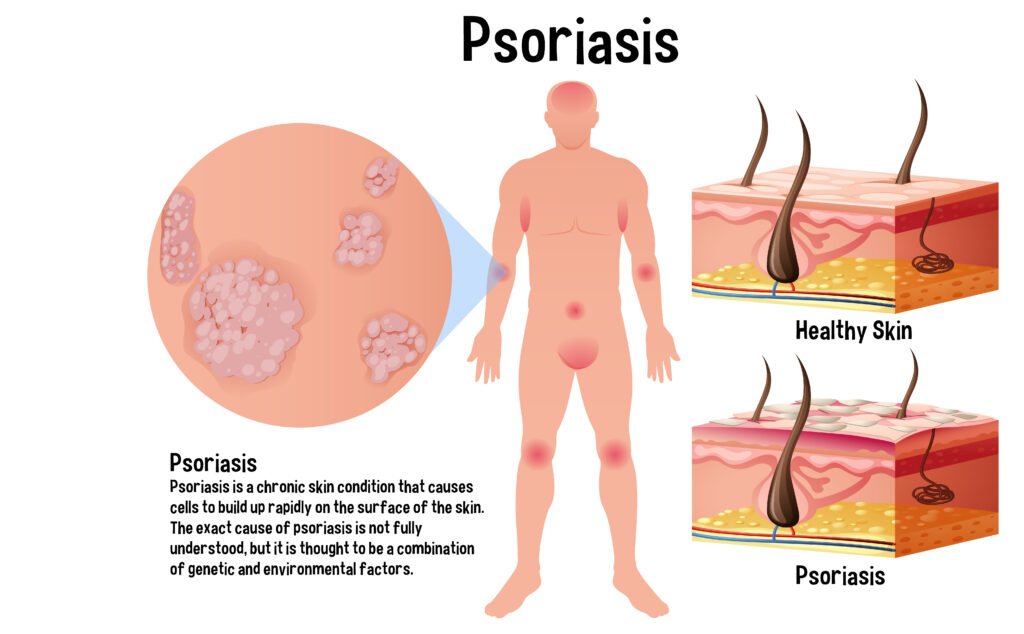Psoriasis - Laser Treatment
- Home/Clinical Dermatology/Psoriasis – Laser Treatment
Laser Treatment for Psoriasis:

Laser Treatment for Psoriasis:
Introduction to Laser Treatment for Psoriasis:-
Psoriasis is a chronic skin condition characterized by red, scaly patches that can appear anywhere on the body. While it is not contagious, it can be physically uncomfortable and affect a person’s confidence. Advances in dermatological treatments, including laser therapy and topicals, offer effective solutions to manage and reduce psoriasis symptoms.
What Is Psoriasis?
Psoriasis is an autoimmune condition where the skin cells multiply faster than usual, leading to the buildup of red, inflamed patches covered with silvery scales. It can affect areas such as the scalp, elbows, knees, and lower back.

Types of Psoriasis:
- Plaque Psoriasis: The most common form, marked by raised, red patches with a scaly surface.
- Guttate Psoriasis: Appears as small, drop-shaped lesions.
- Inverse Psoriasis: Occurs in skin folds, such as under the breasts or around the groin.
- Pustular Psoriasis: Characterized by white pustules surrounded by red skin.
- Erythrodermic Psoriasis: A severe form causing widespread redness, scaling, and discomfort.
Laser Treatment for Psoriasis
Laser therapy is a non-invasive treatment option that targets affected skin areas with precision.
How It Works: Laser therapy emits a concentrated beam of UVB light to reduce the excessive growth of skin cells and calm inflammation.
Steps Involved:
- Consultation: The dermatologist assesses the severity of the condition and determines if laser treatment is appropriate.
- Preparation: The skin is cleansed, and protective eyewear is provided.
- Laser Application: The laser is directed at the affected patches, precisely targeting the psoriasis plaques.
- Post-Treatment Care: Moisturizers or calming creams may be recommended to soothe the skin.
Benefits of Laser Treatment for Psoriasis
- Targeted Approach: Only affects the areas requiring treatment.
- Non-Invasive: No need for injections or incisions.
- Minimal Side Effects: Reduced risk compared to systemic medications.
- Improved Skin Appearance: Reduces redness and scaling.
Other Treatment Options
- Topical Treatments: Corticosteroids, vitamin D analogs, and moisturizers.
- Phototherapy: Exposure to controlled UVB light.
- Systemic Medications: Oral or injectable medications for severe cases.
- Lifestyle Changes: Stress management, a balanced diet, and regular skincare.
What to Expect During Recovery
After laser treatment, the skin may be slightly red or irritated, but this typically subsides quickly. Patients are advised to avoid sun exposure and follow the dermatologist’s recommendations for aftercare.
Why Choose Dermatological Care for Psoriasis?
Managing psoriasis requires a personalized and expert approach. Dermatologists can provide comprehensive care, including advanced treatments like laser therapy, to help patients achieve healthier skin and improved quality of life.
Conclusion
Living with psoriasis can be challenging, but effective treatments are available. Laser therapy offers a promising solution for many patients seeking relief from red, scaly patches.
If you are struggling with psoriasis, consult us to explore personalized treatment options.
